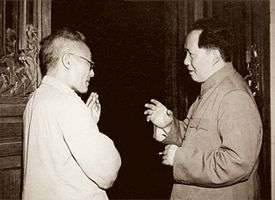Y. T. Wu

Y. T. Wu or Wu Yao-tsung (simplified Chinese: 吴耀宗; traditional Chinese: 吳耀宗; pinyin: Wú Yaòzōng) (4 November 1893– 17 September 1979) was a Protestant Christian leader in China who played a key role in the establishment of the Three-Self Patriotic Movement.[1] Wu also played an important role in the theology of K. H. Ting.[2]
Biography
Wu was born in Guangzhou on 4 November 1893 to a family engaged in commerce. Beginning in 1913, he studied tax at a school for tax studies in Beijing and, upon graduation, worked for a customs office.[3]
Wu converted to Christianity in his youth. In 1918, he became a member of a Congregational Church and was baptized. In 1924, he worked for YMCA, managing its schools and then went to the United States to study at Union Theological Seminary (affiliated with the Columbia University) at New York City, from which he earned a master's degree in philosophy.

Wu became a proponent of the social gospel and emphasized the ethical teachings of Jesus rather than the supernaturally oriented theology. He had been a YMCA secretary, author, and editor of a Christian magazine before the communist revolution in China was complete. Wu was regarded as one of the earliest to reflect on the use of "violence in revolution and theological implications of communism" among Chinese Christian leaders. He was initially critical of the use of force by Chinese communists and considered himself a pacifist and did not want to join the communist party.[1]
However in the 1950s, in consultation with Premier Zhou Enlai, Wu and a number of other Christian leaders published the "Christian Manifesto," eventually signed by 400,000 signatories, that launched the Three-Self Patriotic Movement.[2] He was a dominant figure in the movement [4] until the Cultural Revolution of 1966-1977, during which he was put to forced labor.
Wu died in Beijing on 17 September 1979, one year before the re-establishment of the Three-Self Patriotic Movement and the creation of the China Christian Council, both of which were led for nearly two decades by Bishop K.H. Ting.
Works
- Wu, Yaozong (2010). Wu Yaozong wenxuan [The Selected Works of Y. T. Wu] (in Chinese). Shanghai: TSPM and CCC.
See also
References
- 1 2 McGrath, Alister E., ed. (1995). The Blackwell Encyclopedia of Modern Christian Thought. Oxford: Wiley Blackwell.
- 1 2 Ng, Lee-ming (1972). "A Study of Y. T. Wu". Ching Feng. XV (1): 5–54.
- ↑ Wu Yaozong (Baidu Encyclopedia) (in Chinese) (including his picture)
- ↑ Dunch, Ryan (Spring 2008). "Worshiping under the Communist eye". Christian History & Biography (98): 14–18.
Further reading
- Ting, K. H. (1990). "What We Can Learn from Y. T. Wu Today". International Bulletin of Mission Research. 14 (4): 158–161. ISSN 2396-9393. doi:10.1177/239693939001400402.
- Gao Wangzhi (1999). "Y. T. Wu: A Christian Leader Under Communism". In Bays, Daniel H. Christianity in China: From the Eighteenth Century to the Present. Stanford: Stanford University Press. pp. 338–352. ISBN 978-0-8047-3651-0.